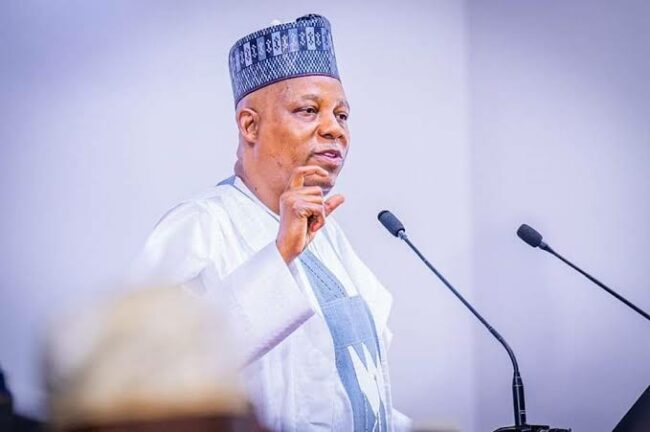Vice President Kashim Shettima has said the recent Supreme Court judgement granting full financial autonomy to local government councils will enhance Nigeria’s universal basic education system.
He made the assertion on Thursday during the public presentation of a new book, “Navigating the Politics of Universal Education Policies in Nigeria,” written by former Deputy Governor of Ekiti State, Professor Modupe Adelabu, held at the NAF Conference Centre, Abuja.
According to him, the autonomy of local governments, which are directly responsible for providing primary education, will address the financial limitations that have hindered the alignment of administrative units with the government’s educational agenda.
The Vice President noted that ongoing reforms initiated by President Bola Tinubu will address inadequacies and ideologies frustrating universal education in the country.
He stated: “As stewards of the nation, His Excellency President Bola Ahmed Tinubu is leading the charge to reform the institutions tasked with overcoming the ideologies and inadequacies that have frustrated universal education in Nigeria.
“The lack of autonomy of local governments, which are responsible for delivering primary education, has created significant financial hindrances to aligning administrative units with our educational agenda.
“However, the recent Supreme Court judgement empowering local government councils to control their resources brings government closer to the people. It provides new hope for our educational initiatives.”
Shettima urged the government at all levels to focus on policies that empower “those at the forefront of implementing initiatives that inspire interest in education.”
Noting that President Tinubu’s decision to establish the Student Loan Scheme in the country was to secure the future of Nigerian children, the VP said, “The initiative ensures that every student has access to loans to pay their tuition, and the Nigeria Education Loan Fund (NELFUND) has already recorded an overwhelming number of applications.
“This is a landmark achievement, signalling the bright future we are building for our youth. Beyond making education universally free, our experience shows that incentivising is the most practical gateway before us. This is why all of us, across all levels and branches of government, must join this campaign to educate the nation.”
Shettima pointed out that the realities inherited by the Tinubu administration “are such that demand urgent action to ensure that education is not only accessible but also desirable for every Nigerian child, fostering long-term national development.
“Many primary and secondary school-age children are still not attending or completing their education, and a large portion of the youth population lacks basic literacy skills, with notable gender disparities. This is what we must overcome,” he added.
The Vice President commended the author of the book, Professor Adelabu, for providing answers to some of the most pressing challenges confronting policymakers, even as he said her book “will undoubtedly inspire informed conversations around the state and future of education in Nigeria.
“As both a theorist and a practitioner in our education sector, Professor Adelabu’s insights are borne out of experience and passion, and I believe this book will serve as a critical resource for all who seek to improve our educational landscape,” he further stated.
Earlier, the Governor of Ekiti State, Biodun Oyebanyi, praised Professor Adelabu’s contributions to Nigerian educational development and society.
“Prof. Adelabu’s life is a testament to the abiding faith of God in our lives. Her quest for excellence and service to humanity is a reflection of her academic excellence and intellectualism,” the governor said.
The book reviewer, Professor Siyan Oyeweso of the Department of History and International Studies at Osun State University, praised Adelabu’s work.
He said, “The author has singled out the politics and financing of education in this book. It’s impossible to separate politics, education, and finance, as the major stakeholders are political players.”
Discussants of the book, including former Minister of Sports and Youth Development Bolaji Abdullahi, highlighted the need to distinguish between school attendance and quality education.
“We’re spending more money on education than ever before. However, we need to make a distinction between going to school and getting an education,” Abdullahi said.
He also called for a review of the Universal Basic Education Commission law, just as he pondered the capacity of local governments to handle complex educational reforms.
The former First Lady of Ekiti State, Erelu Bisi Fayemi, drew attention to the persistent challenges in girl child education.
Citing UNICEF figures, Fayemi noted: “Nigeria has about 18.3 million out-of-school children—the highest in the world—with 50–60% being girls.” She proposed implementing gender-specific education policies and removing obstacles to girls’ education, such as insecurity and conflict.
The book’s author, Professor Modupe Adelabu, emphasised the need for a comprehensive re-evaluation of the education system.
“We need to reevaluate our education system to meet the needs of our country and prepare our children for both domestic and global environments,” Adelabu stated.
She called for a focus on not just academic subjects but also values like democracy, justice, and good governance.
ALSO READ THESE TOP STORIES FROM NIGERIAN TRIBUNE
